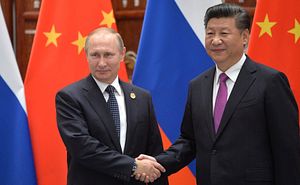On June 8, Chinese President Xi Jinping and Russia’s President Vladimir Putin met during the summit of the Shanghai Cooperation Organization (SCO) held in Kazakhstan’s capital, Astana. Both leaders aimed to strengthen ties between the two nations.
Earlier, in May, during the One Belt One Road Summit held in Beijing, China and Russia agreed to maintain a high level comprehensive strategic partnership and to reinforce all-round cooperation.
This time, Xi emphasized the importance of the strategic partnership again:
In the current situation of global complexity and uncertainty, the good relation between China and Russia is vital to the revitalization of both nations, as well as to world peace and stability. The two sides should increase mutual support on the core interests of each other…and cooperate closely regarding international and regional affairs.
Putin agreed that it was important for Russia and China to maintain close high-level exchanges. He also added that President Xi’s upcoming visit to Moscow will become the year’s major event in bilateral relations.
The visit “will become a huge event as far as bilateral relations are concerned,” said Putin.
It is not the first time both nations’ leaders expressed strong intention to stay close. In March this year, Putin just said Russian-Chinese ties have reached an “unprecedentedly high level” and served as “a model of interaction between great powers in the modern world.”
Also, in late May, China gained Russia’s full support on North Korea issue. Chinese Foreign Minister Wang Yi and Russian Foreign Minister Sergey Lavrov reached an agreement that military means “should never be an option” for solving the North Korea problem.
Other than cooperation on international affairs, China and Russia are reinforcing their economic ties, too.
Russia and China plan to launch the first high-speed freight train service between them in 2019. According to a report of the Russian News Agency TASS, the Moscow-Kazan High Speed Railway’s total length will stand at around 770 kilometers. Trains may go at a speed of 350-400 kilometers per hour and the Moscow-Kazan section may later be extended to China, connecting the two countries across Kazakhstan.

































